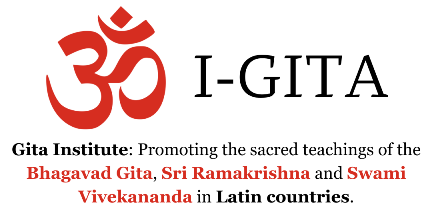Christianity, Ethics and Business (Course)
Catholics, Protestants, Orthodoxy (Course, Christianity and Business)

The Professional Course “Christianity, Ethics and Business” (21 ECTS) taught by EENI Global Business School consists of six modules:
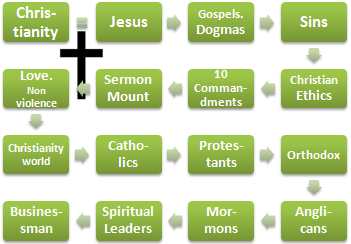
- Introduction to Christianity
- Catholicism and Business
- Protestantism and Business
- Christian Businessmen
- Economic Areas of the Western Civilization
- The role of Agnosticism and Judaism in the Economic Areas of the Western Civilization
Appendix: Transatlantic Slave Trade and Slavery and its Impact on the African, European and American Socio-economic Development.
One-third of Humanity is a Christian.
 Enrol / Request for Information
Enrol / Request for Information

- Credits: 21

- Duration: 21 weeks It is recommended to dedicate about twelve hours of study per week following a flexible schedule. It is possible to reduce the duration dedicating more hours a week
- Tuition Fees: EUR 502
- Open Online Enrollment
- Download the syllabus “Christianity” (PDF)
This course belongs to the following Higher Education Programs taught by EENI:
Doctorate: Ethics, Religions, and International Business, African Business.
Masters: Religions and International Business, International Business, Business in Africa.
Languages: 
- Also available in For improving the international communication skills, the student has free access to the learning materials in these languages (free multilingual training).
 Cristianismo
Cristianismo  Christianisme
Christianisme
The objectives of the course are the following:
- To learn the fundamentals of Christianity
- To analyze the various Christian Denominations (Catholicism, Protestantism)
- To understand the ethical principles of Christianity
- To learn about the influence of Christianity on business
- To analyze the figures of Christian Spiritual Leaders and Businessman
- To know the distribution of Christianity in the World
- To learn about the fundamental role of Christianity in the Western Civilization
- To analyze the economic areas of the Western Civilization and their economic integration process and its relationship with the other civilizations
Note: Orthodox Christianity is not analyzed in this course but in the course Orthodoxy and Business.
“He went about doing good.” Acts 10,34
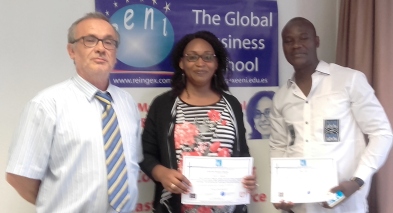
This course contains exercises that are evaluated, which the student must work out and pass to obtain the Diploma of the Professional Course: “Christianity, Ethics and Business” issued by EENI Global Business School.
Modules of the Course
1 - Introduction to Christianity
- Christianity
- Jesus of Nazareth
- Christian Church
- Dogmas of Christianity
- Influence of the three dogmas on the Christian ethics
- Gospels
- Ten Commandments: The pillars of the Christian Ethics
- Teachings of the
Sermon on the Mount
- Love
- Non-Violence
- Christian Golden Rule
- Capital and Social Sins and the Christian moral
- Catholics
- Protestants
- Orthodox
- Other Christian Denominations
“Whatever you want people to do to you, do the same for them, for in this the Law and the Prophets are summed up.” Christian Golden Rule.
2 - Catholicism and Business:
- Introduction to Catholicism
- Catholic Church
- Catholicism in the World: Africa, America, Asia, and Europe
- Case Study: Caritas
- Catholic Businesspeople
- Amancio Ortega: founder of the Spanish fashion group Inditex and one of the largest philanthropists in the world
- Prominent Catholics
- Eastern Catholic Churches: Maronites and Chaldeans
- Nadhmi Shakir Auchi (Chaldean businessman, Iraq - United Kingdom)
- Catholicism and the Western Civilization
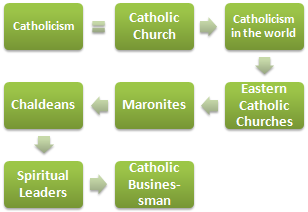
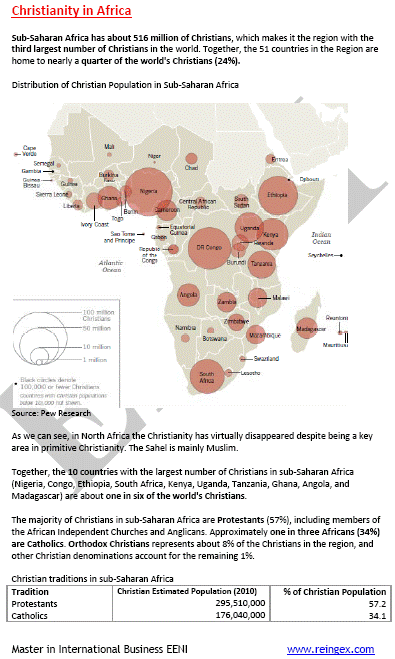
3 - Protestantism and Business:
- Introduction and pillars of Protestantism
- Protestant Ethics
- Protestantism in the World
- Quakers
- Calvinists
- Presbyterians
- Methodists
- Baptists
- Pentecostals
- Protestant Businesspeople
- Prominent Protestants
- Protestantism and the Western Civilization
Other Christian Denominations:
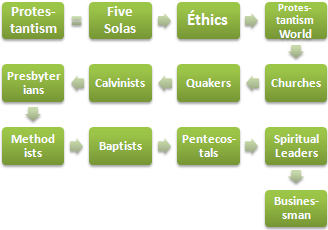
4- Christian Businesspeople
African Christian Businesswomen.
- Isabel dos Santos: the richest woman in Africa (Angola)
- Folorunsho Alakija: the richest Nigerian woman
- Cheryl Carolus: founder of PETONA, a black empowerment company (South Africa)
- Divine Ndhlukula: considered as the most successful business woman in Africa (Zimbabwe)
- Amini Kajunju: President of the African-American Institute (DR Congo)
- Mimi Alemayehou: one of the most powerful African executives (Ethiopia)
The figures of two important African politics are also studied:
- H.E. Nkosazana Dlamini-Zuma: Former President of the African Union (South Africa)
- Ellen Johnson-Sirleaf: former president of Liberia and Nobel Peace Prize winner
African Christian Businesspeople
- Patrice Motsepe: the richest South African businessman (mining companies)
- Cyril Ramaphosa: director of the Sanduka Group (South Africa)
- Mike Adenuga: the third richest African (Nigeria)
- Theophilus Danjuma: founder of one of the largest oil producers in Africa
- Orji Uzor Kalu: Nigerian businessman and philanthropist
- Strive Masiyiwa: one of the key personalities in the telecommunications sector in Africa (Zimbabwe)
- Sifiso Dabengwa: director of the largest telecommunications company in Africa: MTN Group (Zimbabwe)
American Christian Businesspeople.
- Carlos Slim: one of the richest men in the world (Maronite Christian, Mexico)
- Antonio Moraes: founder of the Votorantim Group, is one of the richest people in the world (Brazil)
- John Marinho: president of the largest media conglomerate in Brazil
- Luis Sarmiento: businessman and banker (Colombia)
- Philip Anschutz: U.S. Presbyterian businessman
- Truett Cathy: U.S. Baptist businessman
- Ray Hunt: U.S. Methodist businessman
- Howard Ahmanson: U.S. Pentecostal Entrepreneur
- Steve Strang: U.S. Pentecostal businessman
- Thomas Monaghan: U.S. Catholic businessman. Founder of Domino Pizza

5- Economic Areas of the Western Civilization
- Economic and Cultural Areas of the Western Civilization
- European Economic Area (PDF)
- American Economic Area
- Economic Area of Oceania (PDF)
- African Economic Area (Christianity and Islam are the main religions)
- Economic integration process in the Western Civilization
- Trade relations with the other civilizations
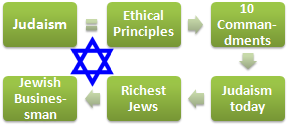
6- The role of Agnosticism and Judaism in the economic areas of the Western Civilization
- Introduction to Judaism
- History of Judaism
- Sacred books (Tanach and Torah)
- Ethical Principles of Judaism
- Ten Commandments
- Contributions of Judaism to the Global Ethics
- Judaism in the world
- Case study: the richest Jews in the world
- Philanthropy and Judaism
- Influence of Judaism on the Western Civilization
Jewish businessmen
- Wendy Appelbaum: investor and South African business woman
- Joseph Safra: one of the richest bankers in the world (Brazil)
- Issad Rebrab: founder of one of the most important African business group (Algeria)
- The pillars of Agnosticism
- Agnosticism and business
- Wole Soyinka (Nobel Prize winner, Nigeria, atheist)
Giving Pledge: the largest philanthropic initiative in the world created by the Americans:
- Bill Gates: founder of Microsoft
- Warren Buffett: one of the largest investors in the world

Appendix: Transatlantic Slave Trade and Slavery and its Impact on the African, European and American Socio-economic Development.
- The Transatlantic Slave Trade as one of the greatest crimes against humanity
- The impact on the African, European and American socio-economic development of Slave Trade
- The benefits for the main western countries benefiting from the transatlantic traffic and slavery: England, France, Holland, Portugal, the U.S., Brazil, Denmark
- The case of Spain as a non-destructive generating empire. The impact of the discovery of America and the beginning of slavery. The first declaration of human rights in the West in favor of the Indians by Isabella, the Catholic
- Losses for Africa: 24 million enslaved Africans
- Abolition of Slavery. The role of Quakers
- African Diaspora in America
Note: the impact of the slave trade carried out by the Arab countries is not included in the course.
“Love your neighbor as yourself” Luke 10:27
With a history of 2,000 years, Christianity is the religion with more followers, 2,300 million worldwide, followed by Islam (1,977 million) and Hinduism (950 million). Approximately there are 7,000 million people Worldwide, i.e., approximately:
Christianity is spread worldwide. In 1910 (according to PewForum) had about 600 million Christians, 66% of Christians lived in Europe.
However, today Europe represents only 26% (565 million) of Christianity, America (37%, 804 million) surpasses Europe, Africa has 24% (516 million) of Christians, and the Asia-Pacific region has 13% (285 million).
From this point of view:
Christianity is probably the most globalized of all religions.
Christianity shares spaces with virtually all the Religions of the World: Islam, Hinduism, Buddhism. This privileged position should be one of his strengths, and thus a key player in the inter-religious dialogue and the pursuit of a Global Ethics model. This geographic diversity allows us to better understand Christianity.
Christianity is lived very differently by a Catholic from the Philippines or Spain, by a Russian Orthodox or by a North American Protestant. In many countries and regions (especially in Africa) it should be taken into account the syncretism with Animist religions (African Traditional Religions).
Christianity is present in the historic opulence of the Vatican, but also on a modest mission in Central America.
The Christian Civilization has seen the birth of great holy men (St. Thomas Aquinas, St. Augustine, Teresa of Calcutta, Henry David Thoreau, Leo Tolstoy, Albert Schweitzer, Pierre Teilhard de Chardin, Martin Luther King, Vincent Ferrer, Hans Kung, Desmond Tutu, Martin Luther King), but also has led to the emergence of the great Satan of the history of humanity (Hitler, Stalin) These Satan have emerged when a totalitarian state replaces religion.
We must be able to differentiate the simple message of Jesus, based on love, on the actions committed by the Church throughout its history; we must be able to prosecute these actions as fruits of the human being. Only thus; we can understand the beautiful message of Christianity:
Love, non-violence, social justice, and peace among men.
“Love is patient and kind.
Love does not envy; love does not boast; it is not proud.
It is not rude; it is not self-seeking; it is not easily angered; it keeps no record of wrongs.
Love does not delight in evil but rejoices with the truth.
It always protects, always trusts, always hopes, and always perseveres.
Love never fails.”
Corinthians 13:4-8
We must never forget that all three religions of the book, Christianity, Islam, and Judaism have common roots: The three are monotheistic - share the same God, are “historical-prophetic” religions and the ethical principles are very similar.
Like Judaism and Islam, Christianity is a historical religion, focused on the figure of one of the spiritual geniuses of humanity: The Jewish Jesus of Nazareth. Jesus shares many principles with other great spiritual geniuses of the history. Almost all of them left nothing written, did not have or reneging of their possessions, surely they did not know writing; we hardly know anything about their lives, especially of his youth. Moreover, none of them wanted to create any religion; they were primarily reformers.
Jesus, like Buddha, Mahavira, Mohammed or Lao-tse, brought a message of liberation, of renewal, based primarily on the Non-Violence and love to the neighbor, a true social revolution.
The concept of Christian love should be a fundamental component of a global ethic.
It is important to reflect that we have so little information about his life, and today, 2,000 years later, the spiritual figure that most people worship in the World.
Moreover, it is also important to be aware that both Hinduism (900 million) as Muslim (1,977 million) consider him a holy man.
“He has sent down upon you, the Book in truth, confirming what was before it. Moreover, He revealed the Torah (law of Moses) and the Gospel of Jesus (Isa), as a guide to humanity, and he sent the criteria between the goodness and badness.” Holy Qur'an, Sura 3
“The same God was revealed, incarnate in Christ, speaking through the Prophet Muhammad, or like Vishnu the Preserver or Shiva the Finisher” Sri Ramakrishna.
Catholics, Orthodox, and Copts share the same Seven Sacraments.
- Baptism: removes the original sin of man
- Holy Eucharist: The Body and Blood of Christ are received
- Confirmation of Christian faith
- Penitence: repentance and confession of sins to a priest for forgiveness from God
- Anointing of the Ill
- Sacerdotal order: only for those who will form part of the Church
- Marriage
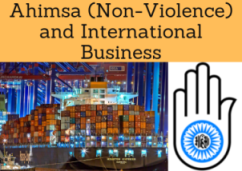

Why study the course “Christianity, Ethics and Business”?.
This Professional Course is aimed primarily at those executives and companies wishing to do business in the countries where Christianity, Catholicism (50% of all Christendom) and Protestantism (37%), is the majority religion. These “Christian” countries make up the Economic Area of the Western Civilization, made up of the European Economic Area (26% of Christianity), the American Economic Area (37%), the African Economic Area (24%) and the Oceanian Economic Area.
In these markets, the influence of Christianity is very important in the way of doing business and in its culture.
Christianity is the largest religion in the world (2,300 million), that is: one third of humanity is Christian. 126 countries have a Christian majority, while 71 countries have a significant Christian minority.
Anyone who does not belong to the Western Civilization (Islamic, Hindu, Buddhist, Sinic...) should know the pillars of Christianity, both Catholicism and Protestantism, and how they influence the way of doing business of the western companies, which can be very different compared to the companies of other economic areas, and thus avoid the intercultural conflicts (more information).
European Christian Businesspeople (Orthodox).
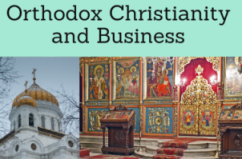
Arab Christian Businesspeople.
11- Other Distinguished Christians:
(c) EENI Global Business School (1995-2024)
We do not use cookies
Top of this page




